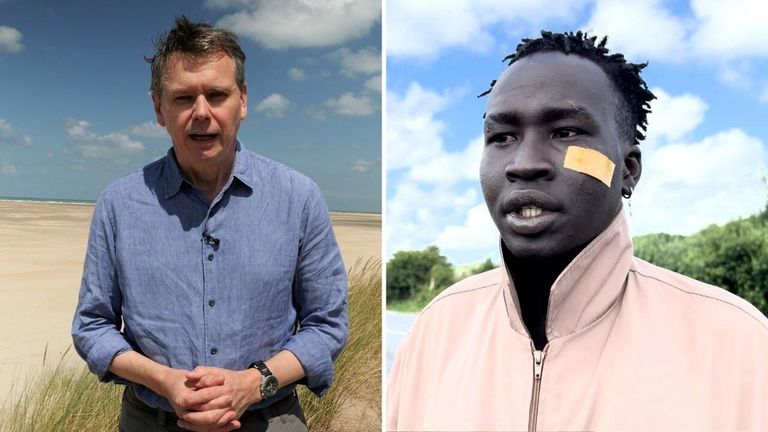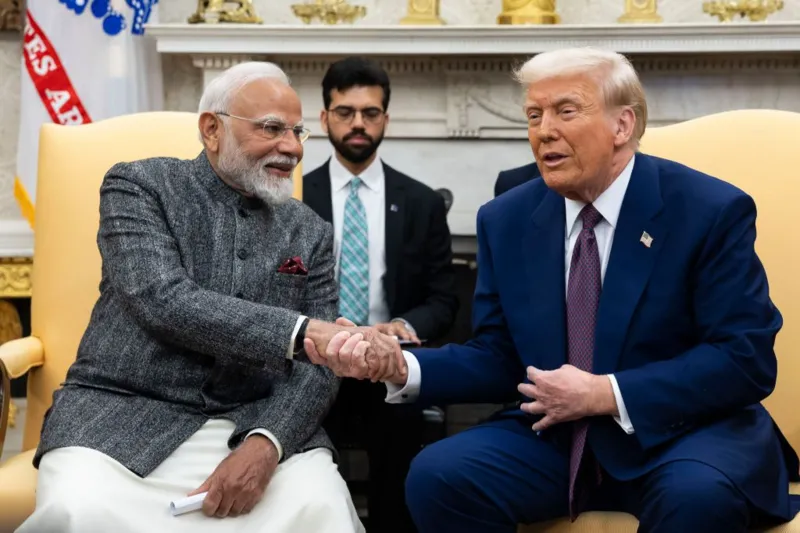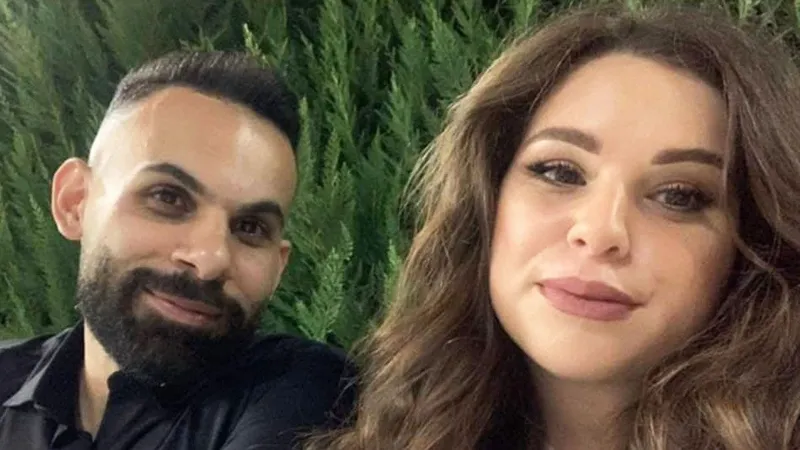US president accused of 'openly calling for ethnic cleansing' with 'dangerous' Gaza plan
Donald Trump has proposed the US "take over" Gaza and "level it" after meeting Israel's prime minister. Allies and adversaries have condemned the plan, which would be a violation of international law.
Everything Trump said in his shock Gaza announcement
Donald Trump laid out his shock Gaza announcement at a news conference in Washington last night, alongside visiting Israeli prime minister Benjamin Netanyahu.
Here's a detailed rundown of what we heard - and some of the reaction.
'We will own Gaza'
Donald Trump prompted a wave of international outrage with his announcement that the US will "take over" and "own" Gaza.
Asked on what authority the US could take control of Gaza, he did not give a clear answer, saying he saw a "long-term ownership position" which would, he claimed, bring stability to that part of the Middle East.
"We will own it and be responsible for dismantling all of the dangerous unexploded bombs and other weapons on the site," he said.
He said the US would "get rid of the destroyed buildings, level it out, create an economic development that will supply unlimited numbers of jobs and housing for the people of the area".
What he said about Palestinians whose home is Gaza
Trump said Washington would ask other neighbouring countries to take in Palestinians displaced from Gaza. He has repeatedly asked Egypt and Jordan to do so over the last fortnight. They and other Arab states have rejected his proposal.
"Instead, we should go to other countries of interest with humanitarian hearts, and there are many of them that want to do this and build various domains that will ultimately be occupied by the 1.8 million Palestinians living in Gaza, ending the death and destruction and frankly, bad luck. This could be paid for by neighbouring countries of great wealth," he said.
Gaza's population before the war was 2.3 million.
Forced displacement of Gazans would be a violation of international law and would be fiercely opposed by other countries in the region and Western allies of the US. Trump's suggestion that the people of Gaza should be "permanently resettled" has been described as an endorsement of ethnic cleansing by human rights experts.
UN experts have defined ethnic cleansing as "a purposeful policy designed by one ethnic or religious group to remove by violent and terror-inspiring means the civilian population of another ethnic or religious group from certain geographic areas".
Gazans 'only want to return home because they have no alternative'
Trump also claimed the "only reason" Gazans wanted to return was because they had no alternative.
"I don't think people should be going back to Gaza," he said.
"Gaza is not a place for people to be living, and the only reason they want to go back, and I believe this strongly, is because they have no alternative…
"If they had an alternative, they'd much rather not go back to Gaza and live in a beautiful alternative that's safe."
Will US send troops for Trump's plan?
Asked if the US would send troops to Gaza to help facilitate his plan, Trump said: "We'll do what is necessary. If it's necessary, we'll do that. We're going to take over that piece.
"We're going to develop it, create thousands and thousands of jobs, and it'll be something that the entire Middle East can be very proud of.
He also said Gaza could become "the Riviera of the Middle East" where "the world's people" could live.
The remarks echoed previous comments from his son-in-law Jared Kushner, who said Gaza had very valuable "waterfront property".
What he said about two-state solution
Asked if he was still committed to a plan similar to the one he spelled out in 2020 that described a possible Palestinian state, Trump said: "Well, a lot of plans change with time."
Asked if the plan he had suggested meant he was now opposed to a two-state solution, he said: "It doesn't mean anything about a two-state or one state or any other state. It means that we want to have, we want to give people a chance at life.
"They have never had a chance at life because the Gaza Strip has been a hellhole for people living there. It's been horrible."
Claims of support from Middle East leaders
Trump suggested he had received support from other leaders in the Middle East, without providing any names of those leaders.
"This was not a decision made lightly," he said.
"Everybody I've spoken to loves the idea of the United States owning that piece of land, developing and creating thousands of jobs."
What other Middle East nations have said
Saudi Arabia said it would not establish ties with Israel without the creation of a Palestinian state, contradicting Trump's claim that Riyadh was not demanding a Palestinian homeland.
Saudi Crown Prince Mohammed bin Salman has affirmed the kingdom's position in "a clear and explicit manner" that does not allow for any interpretation under any circumstances, Saudi's foreign ministry said in a statement.
As mentioned previously, Jordan and Egypt have both rejected suggestions that people in Gaza would be relocated in their countries.
What have Palestinian groups said?
Hamas has condemned Trump's calls for Palestinians in Gaza to leave as "expulsion from their land".
The Palestinian envoy to the United Nations, Riyad Mansour, said world leaders and people should respect Palestinians' desire to remain in Gaza.
"Our homeland is our homeland," he said - read his comments in full in our post at 824am.
Far-right Israeli politician Ben Gvir praises Trump idea as 'only solution'
If you scroll down to our post at 7.38am, you'll see our Middle East correspondent said Donald Trump's comments are "red meat" to those in Israel who have long wanted to resettle Gaza.
Far-right politician Itamar Ben Gvir was quick out the blocks to praise Trump, describing the president's idea to resettle Gazans elsewhere as the "only solution".
In a post on social media, he said "encouraging" Gazans to migrate from the enclave was the only correct strategy, urging Prime Minister Benjamin Netanyahu to adopt this policy "immediately".
"When I said this time and again during the war that this was the solution to Gaza, they mocked me," he added.
"Now it is clear: this is the only solution to the Gaza problem - this is the strategy for the 'day after'."
Ben Gvir, who is part of a movement advocating for Jewish settlement in the territory, resigned from Netanyahu's cabinet last month over the ceasefire deal.
Explained: What is the two-state solution?
After Trump's shock proposal that the US "take over" Gaza, many countries have reaffirmed their commitment to a two-state solution - like the UK in our previous post.
But what is it?
The two-state solution long been proposed as the best hope for peace in the Israeli-Palestinian conflict. It would see an independent Palestinian state established alongside the existing one of Israel - giving both peoples their own territory.
It is the official position of the UK, US and the United Nations.
What would it look like - and who would live where?
The biggest obstacle to a two-state solution is deciding what the borders of a potential Palestinian state would be.
Many believe they should be the same ones that existed before the 1967 Six-Day War, which saw Israel occupy East Jerusalem, the West Bank and Gaza.
Since then, increasing numbers of Israeli settlements have been established inside the West Bank, with around 600,000 Israelis now living there and in Occupied East Jerusalem.
Although these settlements are considered illegal under international law, their existence makes the territory increasingly difficult to designate as Palestinian.
The creation of Israel and the subsequent Arab-Israeli war of 1948 saw many Palestinians forced from their homes, in what is known as the Nakba, or "catastrophe" in English.
As such, the UN gave around 750,000 people refugee status, defined as people "whose normal place of residence was Palestine during the period 1 June 1946 to 15 May 1948, and who lost both home and means of livelihood as a result of the 1948 conflict".
But under the same criteria, 5.9 million Palestinians - who live in the West Bank, Gaza, East Jerusalem and in camps across Jordan, Lebanon and Syria - now qualify, and many would want to return to their homeland.
There would not be space for this increased number of people inside the occupied territories, meaning some would have to be resettled in Israeli territory, which Israel is unlikely to tolerate.
There are particular border difficulties with Jerusalem.
Both sides claim the ancient city as their capital. This is because of its huge historical and religious significance for both Israelis and Palestinians and the fact it is home to several holy sites in Judaism, Islam, and Christianity.
UK: Two states is 'only' solution to Middle East conflict
Palestinians should be able to return to their homes and "rebuild their shattered lives" in Gaza - that's the view of the UK government, according to the environment secretary Steve Reed, who has told us peace can "only be based on a two-state solution".
Speaking to our chief presenter Kay Burley, he said Palestinians have faced "a living nightmare for the last 14 months" and should be able to start rebuilding their homes with the help of the international community.
The UK government wants to reach "a long-lasting peace" in the region, he continued, which "can only be based on a two-state solution with a secure Israel living at peace with its neighbours, and a free and viable Palestinian side state alongside".
Pushed for a specific response to Donald Trump's comments, Reed said he won't "provide a running commentary on the pronouncements of the president of the United States or any other world leader".
He added, however, that he was not being disparaging of Trump in any way, and gave him credit for helping secure the current ceasefire.
'Our homeland is our homeland': How Palestinian officials have reacted
The reaction to Trump's Gaza plan from Palestinian authorities has been swift and unsurprising.
Riyad Mansour, the Palestinian UN ambassador, firmly rejected the resettlement proposals, saying: "Our homeland is our homeland.
"The Palestinian people selected the choice to return to it. We should be respecting the selections and the wishes of the Palestinian people," he said in a video posted on X.
"They want to rebuild the schools, the hospitals, the roads, the infrastructure, the buildings and the homes because this is where they belong, and they love to live there."
He added: "Those who want to send them to a happy nice place, let them go back to their original homes inside Israel."
The Palestine Liberation Organisation, which is internationally recognised as the representative of the Palestinian people, reaffirmed its backing of the two-state solution.
Hussein Sheikh, its secretary general, said it was a solution that would guarantee "security, stability and peace".
'F*** around, find out' - Trump threatens to rip up old world order
Does the key to understanding Donald Trump's foreign policy lie in his New York business dealings in the 1970s? That's what Richard and Yalda ask themselves on this week's edition of The World podcast.
It comes after Trump posted this AI generated image of himself - with FAFO usually meaning "f*** around, find out"...
From tariffs to trade wars and a proposed slashing of the overseas aid budget, Richard and Yalda unpack another tumultuous week in which Trump threatens to rip up the old world order.
-SKY NEWS






